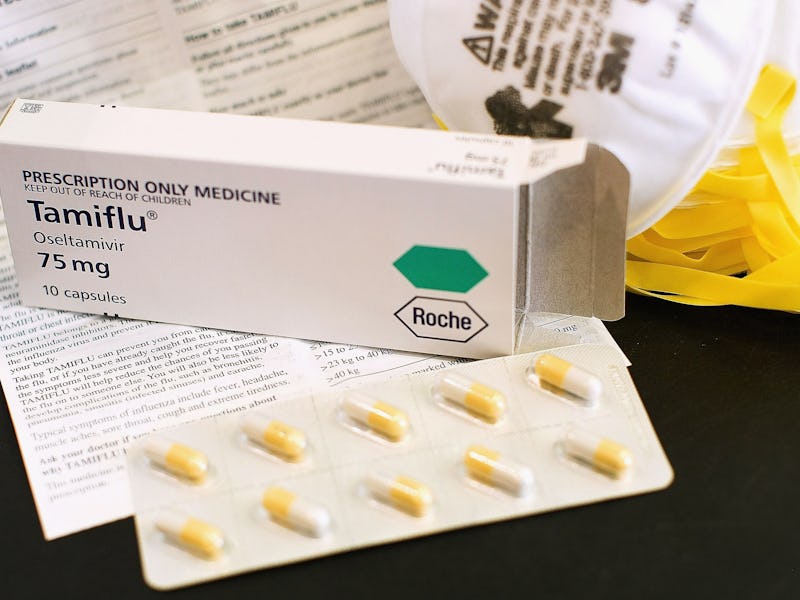A Monster of a Flu Season Has the CDC Hunkering Down on Strategies
This year's strain is particularly vaccine-resistant.

If you look at the news, you’ll see that this flu season seems particularly bad. As of last week, 20 children have died from the flu and flu-related complications during the 2017-2018 flu season. As Inverse previously reported, some states are reporting much higher rates of flu-related hospitalizations than last season. One of the factors experts highlight is that this season’s dominant strain of the influenza virus — the virus that gives you the flu — is one that doesn’t respond well to vaccines: influenza A(H3N2).
In a Public Health Grand Rounds on Tuesday, scientists at the Centers for Disease Control and Prevention in Atlanta gathered in-person and online to address what is unique about the 2017-2018 flu season and what doctors and average people can do to deal with it. Since vaccines are only about 32 percent reliable on H3N2 — though you should definitely still get the shot — a lot of people will be receiving antiviral drugs like Tamiflu when they get sick.
“With the spike in flu cases around the country, this Grand Rounds will provide key and timely information for public health professionals on how to reduce the spread of seasonal flu in communities and adjust to spot shortages in antiviral drugs because of high influenza activity,” read the CDC announcement that outlined how Tuesday’s presentation would no longer be titled “Public Health Response to a Nuclear Detonation,” a disturbingly relevant topic. The fact that the CDC canceled that presentation in favor of one about the flu should show just how serious this flu season is. (It’s also entirely possible, however, that this rescheduling occurred because of the shitstorm Hawaii’s false missile launch alert created over the weekend.)
Still, the fact remains that every single year there is a flu epidemic. The principle behind these perennial epidemics is “persistence through plasticity,” said Dan Jernigan, MD, MPH, the director of the CDC’s Influenza Division. To put it simply, the influenza virus is always mutating to get around the vaccine and people’s natural immunities. “These constant changes do allow for adaptation,” he said. This adaptation makes it really hard to match a virus to the flu strain that’s circulating.
So with H3N2 as the major flu strain getting people sick this season, it’s possible you’ll get sick. And if you do, it’s likely you’ll receive antiviral drugs. The CDC recommends drugs belonging to the class called neuraminidase inhibitors, which block the enzyme that the influenza virus needs to reproduce. Clinical trials have shown that neuraminidase inhibitors are effective against both influenza A and influenza B, unlike the older M2 inhibitors. This is good for flu patients because you could still come down with one of the other common flu strains.
Here’s the thing, though: There haven’t been any double-blind placebo-controlled trials of these antiviral drugs on influenza cases, says Alicia Fry, MD, MPH, the chief of the CDC Influenza Division’s Epidemiology and Prevention Branch. They do show some significant positive results, though. According to Fry, early treatment with antiviral drugs does improve outcomes — something that can be seen even without placebo trials. It reduces mortality in adults, it reduces the severity of the illness in children, and it reduces the duration of sickness.
For anyone over a few weeks old, especially during the first 48 hours of a flu infection, antivirals can help shorten the duration of sickness by one to 2.5 days. This might not sound like much, and it’s not, but that’s a couple fewer days you’ll feel like crap when you’re sick, a couple days fewer you’ll need to stay home from work or school.
“Secondary benefits included 50%–70% fewer complications, 30%–50% fewer courses of antibiotics compared with placebo and earlier return to normal activities by 1–3 days,” reads a Canadian Medical Association report on antivirals.
According to the CDC, nationwide supplies of antivirals are good in the United States, though they recommend that patients and doctors call ahead to their pharmacies to ensure that they’re in stock.
So yeah, you might be able to tough it out, but for people who are particularly susceptible to flu complications — the young, the old, and those with immune system issues — go to the doctor to get some dang antivirals as soon as you realize you have the flu.